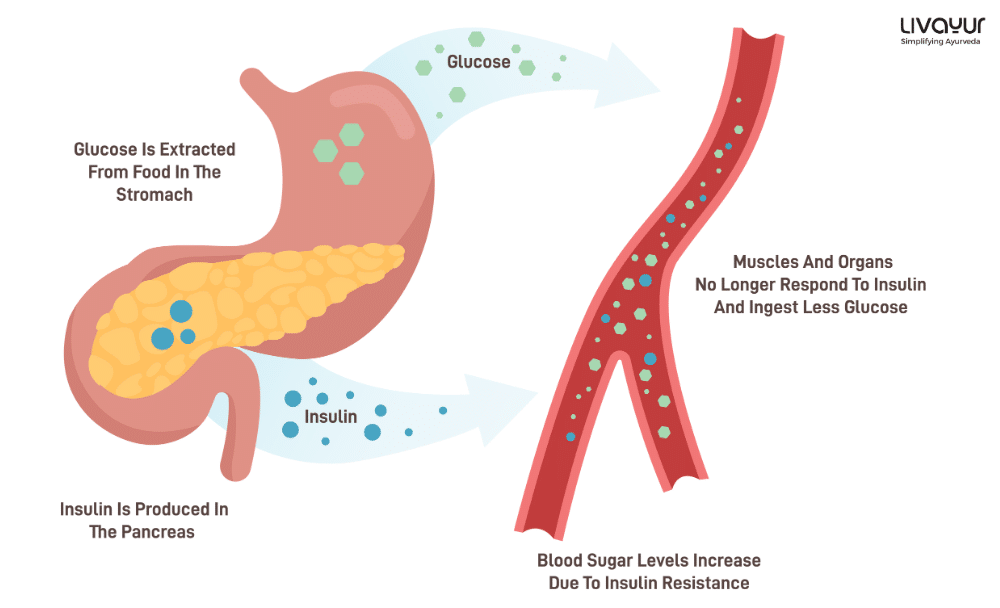Reviewed By Dr. Vipin Bihari Sharma

Type 2 diabetes, the commonest diabetes type, is a chronic condition in which the patient experiences elevated blood sugar levels. It is grouped under metabolic disorders. The disorder results from insulin resistance and inadequate insulin production. It is a prevalent condition worldwide, affecting millions of people. [1] This article will throw light on the details of Type 2 diabetes, including the causes of type 2 diabetes, type 2 diabetes symptoms, various risk factors, and available treatments.
What is type 2 diabetes?
Also referred to as non-insulin-dependent diabetes, type 2 diabetes means a complex condition that occurs due to various environmental and genetic factors. [2] It occurs when the body becomes resistant or inert to insulin or fails to produce enough insulin to regulate blood sugar effectively. When insulin resistance develops, glucose accumulates in the bloodstream, leading to high blood sugar levels.
The disease can potentially harm different organ systems, resulting in severe health complications that can be disabling or life-threatening. These complications primarily involve the microvascular system, leading to conditions such as retinopathy (damage to the retina), nephropathy (kidney damage), and neuropathy (nerve damage), an increased risk of macrovascular complications, which can cause cardiovascular diseases, with a heightened risk ranging from two to four times higher than normal. [3]
Symptoms of Type 2 Diabetes:
The type 2 diabetes symptoms may show up gradually and can include:
- Fatigue, irritability, and weakness
- Unexplained weight loss
- Restlessness and body pain
- Blurred vision
- Slow-healing wounds and frequent infections in genital areas, skin, oral cavity, and urinary tract
- Tingling or numbness in the hands or feet
- Darkened patches of skin, especially around the neck and armpits (acanthosis nigricans)
- Dry mouth
- Itching [4]
Causes of Type 2 Diabetes:
Multiple factors contribute to the development of diabetes Type 2. Some of the type 2 diabetes causes include:
Insulin Resistance:
Insulin resistance occurs when the body’s cells respond weakly or do not at all respond to the effects of insulin. This triggers overproduction of insulin by the pancreas, eventually resulting in insufficient insulin to regulate blood sugar.
Genetics:
A family history of diabetes mellitus type 2 increases the risk of developing the condition.
Obesity:

Excess body weight, particularly abdominal fat, is strongly associated with developing insulin resistance and type 2 diabetes.
Sedentary Lifestyle:
Lack of physical activities and a sedentary lifestyle contribute to insulin resistance and obesity, increasing the risk of Type 2 diabetes.
Poor Diet:
Consuming excessive amounts of sugary beverages, processed food items, and unhealthy fats can contribute to the development of type 2 diabetes. [5]
Risk Factors for Type 2 Diabetes:
Certain factors increase the risk of developing diabetes mellitus type 2, including:
Inflammatory factors:
Research has shown that low-grade inflammation triggered by various mediators plays a significant role in developing Type 2 diabetes. It has been seen that there is a positive correlation between CRP and WBC levels and insulin resistance, and impaired glycemic status.
Family History:
Having a close relative with Type 2 diabetes increases the likelihood of developing the condition.
BPA exposure:
Exposure to bisphenol A (BPA) has been identified as a major risk factor for type 2 diabetes. Studies have indicated that BPA, commonly found in plastic products, can disrupt insulin signaling and contribute to insulin resistance, a key factor in developing type 2 diabetes.
Smoking and heavy alcohol consumption:
Smoking increases insulin resistance and impairs glucose metabolism, while excessive alcohol intake can cause weight gain, insulin resistance, and inflammation, all of which contribute to the development of Type 2 diabetes.
Adipocytokines and hepatocyte factors:
Adipocytokines, such as adiponectin and leptin, along with hepatocyte factors, have been looked upon as risk factors for type 2 diabetes. Dysregulation of these factors can disrupt insulin signaling, promote inflammation, and contribute to insulin resistance and impaired glucose metabolism, increasing the risk of developing Type 2 diabetes.
Excess caloric intake:
Excess calorie intake and body weight is a significant risk factor.
Sedentary Lifestyle:
Lack of physical activity and prolonged sitting time increase the risk of Type 2 diabetes. [6]
Treatment of Type 2 Diabetes:
The management of Type 2 diabetes aims to control blood sugar levels, prevent complications, and improve overall health. Type 2 diabetes treatment options include:
Lifestyle Modifications:
Adopting a healthy diet, engaging in regular exercise and yoga, including vitamins C, E, and D supplements, and achieving and maintaining a healthy weight are crucial aspects of diabetes management.
Medications:

Several oral medications and injectable insulin can help control blood sugar levels and with Type 2 diabetes treatment. Medication choices are varied including insulin sensitizers such as Thiazolidinediones, Biguanides, Sulfonylurea, and Meglitinides depending on various factors such as individual needs, medical history, and the stage of diabetes.
Herbal products:
Include items like cinnamon, garlic and, berberine in the diet as they are essential nutraceuticals that promote insulin secretion and glucose uptake, have antioxidant activity, and help in the activation of AMPK which leads to increase in glucose uptake. [7]
FAQs
Can Type 2 diabetes be treated by Ayurveda?
Ayurveda offers a comprehensive approach to the treatment and management of Type 2 diabetes. It encompasses various healthcare measures and suggests the use of specific Ayurvedic herbs like Amla and Triphala, known for their potential in managing diabetes.
Which dosha is the main cause of Type 2 diabetes?
According to Ayurveda, an imbalanced Kapha dosha is considered the primary factor behind the development of type 2 diabetes. This imbalance is often attributed to a sedentary lifestyle and unhealthy dietary choices.
What is considered the best medicine for type 2 diabetes?
The use of specific herbs and formulations such as bitter melon (Karela), fenugreek (Methi), and Indian gooseberry (Amla) can help manage blood sugar levels. Zanducare.com offers the purest form of Karela capsules & Methi capsules for the best blood sugar management. Polypeptide-p, an insulin-like compound in Karela can lower your blood sugar levels effectively. Methi (fenugreek) can speed up blood sugar metabolism and help control blood sugar levels. Place your order without delay!
Conclusion:
Type 2 diabetes is a chronic lifestyle-related metabolic condition that hits a significant portion of the population. Understanding type 2 diabetes symptoms, causes, risk factors, and treatment options is vital for effective management and prevention of complications. By making lifestyle modifications, monitoring blood sugar levels, and following medical advice, individuals with type 2 diabetes can lead healthy and fulfilling lives while keeping their condition under control.
Disclaimer:
This article is written from a health and wellness perspective only and is not a piece of medical advice. Kindly seek the help of a certified medical practitioner before initiating any treatment.
References:
- Diabetes Mellitus Type 2
- Heritability of type II (non-insulin-dependent) diabetes mellitus and abnormal glucose tolerance–a population-based twin study
- Type 2 Diabetes
- Know the signs and symptoms of diabetes
- Type 2 diabetes mellitus
- Advanced research on risk factors of type 2 diabetes
- Current treatments for type 2 diabetes, their side effects and possible complementary treatments
Manage Diabetes With The Knowledge Of Ayurveda (Download Ebook)

















